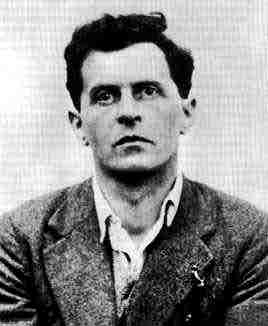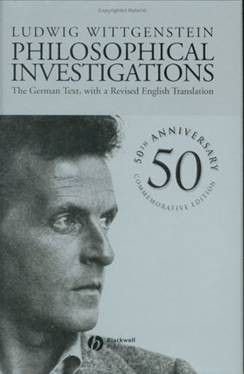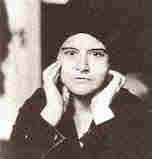|
"Chess... is eminently and emphatically
the philosopher's game"
-Paul Morphy-
The publisher of
The Cambridge Companion to Wittgenstein, tells us:
Ludwig Wittgenstein (1889–1951) is one of the
most important, influential, and often-cited philosophers of the twentieth
century, yet he remains one of its most elusive and least accessible. The essays
in this volume address central themes in Wittgenstein’s writings on the
philosophy of mind, language, logic, and mathematics. They chart the development
of his work and clarify the connections between its different stages. The
contributors illuminate the character of the whole body of work by keeping a
tight focus on some key topics: the style of the philosophy, the conception of
grammar contained in it, rule-following, convention, logical necessity, the
self, and what Wittgenstein called, in a famous phrase, ‘forms of life’.
Additional Information on
Ludwig Wittgenstein
Wikipedia
The
Stanford Encyclopedia of Philosophy
A
comprehensive site on Wittgenstein
This article was written in its entirety by Lawrence Totaro of
Ultimate Chess Collecting
Ludwig Wittgenstein
(April 26, 1889 – April 29, 1951)

“I might say that chess would never have been invented apart from the
board, figures, etc. and perhaps apart from the connection with troops in
battle.”
On page 186 of The Immortal Game, David Shenk offers examples of three
prominent men in regards to their use of chess. He mentions at least one work
for each except for Ludwig Wittgenstein.
He writes about Richard Feynman: “The legendary American physicist and
physics teacher Richard Feynman relied heavily on chess in his lectures at the
California Institute of Technology (later published in the 1904 book Six Easy
Pieces: Essentials of Physics Explained by its Most Brilliant Teacher) to
help decode the scientific process for his students.”
As for Italo Calvino, Shenk goes on to write: “Italo Calvino, the whimsical
and postmodern Italian author of Cosmicomics, If on a Winter’s Night a
Traveler, and other influential fictions, was impressed by chess’s ability
to transform limitless data into a simple impression.”
The author continues: “Austrian-born British philosopher Ludwig Wittgenstein,
regarded by many as the most important philosopher of the twentieth century, was
utterly fascinated by chess, referring to the game nearly two hundred times in
his writings.”

It should be noted that “in his writings” means the grandiose work titled,
Philosophical Investigations (1951, published posthumously) which mentions
chess to a large extent depending upon which publication you own. According to
the Blackwell published work he writes “chess” 181 times [see this excellent
paper by Steven B.
Gerrard] But not only is chess mentioned in Philosophical
Investigations; a popular excerpt is given below taken from, The Blue and
Brown Books:
a. "The meaning of a phrase for us is characterized by the use we make of it.
The meaning is not a mental accompaniment to the expression . . . I want to play
chess, and a man gives the white king a paper crown, leaving the use of the
piece unaltered, but telling me that the crown has a meaning to him in the game
. . . I say: "as long as it doesn't alter the use of the piece, it hasn't what I
call a meaning.""
Also keep in mind that Wittgenstein, considered by students and many
scholars, is considered “an Austrian philosopher” and not British as stated
above.
In Wittgenstein's Lectures: Cambridge, 1932-1935 (Edited by Alice
Ambrose) Wittgenstein mentions “chess” 54 times.
Below are some excerpts.
Page 3
“2. Words and chess pieces are analogous; knowing how to use a word is like
knowing how to move a chess piece. Now how do the rules enter into playing the
game? What is the different between playing the game and aimlessly moving the
pieces? I do not deny there is a difference, but I want to say that knowing
how a piece is to be used is not a particular state of mind which goes on
while the game goes on. the meaning of a word is to be defined by the rules
for its use, not by the feeling that attaches to the words.”
Page 101
“It is a fallacy to suppose these languages are incomplete. Primitive
arithmetic is not incomplete, even one in which there are only the first five
numerals; and our arithmetic is not more complete. Would chess be incomplete
if we knew another game which somehow incorporated chess? It would merely be a
different game. To think otherwise is to confuse mathematics with a natural
science.”
The most striking excerpt is from page 194
“I might say that chess would never have been invented apart from the
board, figures, etc. and perhaps apart from the connection with troops in
battle. No one would have dreamed of inventing the game as played with pencil
and paper, by description of the moves, without the board and pieces. Still
the game could be played either way. It is the same with mathematics.”
It is clearly evident that Wittgenstein mentions “chess” more than just two
hundred times.
Below are excerpts from: Understanding Wittgenstein: Studies of Philosophical
Investigations. J. F. M. Hunter (1985)
For naming and describing do not stand on the same level: naming is a
preparation for description. Naming is so far not a move in the language-game
-- any more than putting a piece in its place on the board is a move in
chess. We may say: nothing has so far been done, when a thing has been
named. It has not even got a name, except in the language-game.
We can now perhaps better understand §31. Having been told about the
various pieces and how they move, without being shown a chess set, one can,
when the men are produced, ask 'Now which of these is the king?', that is,
which of these is the piece that moves one square in any direction, cannot
move into check, and so on; and one can in a different case, not yet having
had the game at all explained, but knowing something about board games, ask
'Which piece is this?', meaning something like 'Which of the roles you will be
telling me about attaches to this one?' One can understand the words 'That is
the king' without knowing any more than that if a piece has a different name
from other pieces, it will have a different role; but anyone knowing less than
that will not understand. He will not have grasped the essential point that
although (blindfold chess aside) there must be a re-identifiable physical
object, that object is not called the king on account of its physical
properties, but on account of its role in the game. (That needs some
qualification: it is good practice to design all chess sets in such a way that
players will not have to learn afresh with each set they use, which piece is
which, but it is not as if one simply could not play using a salt shaker for a
king
It is obvious that chess could be taught and played without ever naming
the pieces, and that if we were nevertheless fond of names, each player could
have his own set of them without in any way affecting the play. Some
awkwardness would arise when the game was discussed, or a player's record of
the moves was studied, but it would be a simple business to reach complete
understanding of any player's terminology. It is not so clear however what the
importance of that fact is, when we remember that it is using words, not doing
things with the objects they name, that we are trying to understand. It is not
what corresponds to managing to play chess that we are concerned with, but
what corresponds to managing to talk chess language.
There would also be intermediate cases, of which chess pieces would be a
nice example. Propositions about the role of a piece would be like statements
of the function of a knife; and there are also propositions like 'It is not a
knight if its shape does not represent a horse's head'. The latter
propositions would tend to establish the word 'knight' as the name of an
object, were it not that they are true only of certain chess sets, and were it
not that we can play chess without any object holding the knight's place, but
cannot play hockey without a puck. We could perhaps say that when playing
chess with a given full set of pieces, 'knight' is the name of an object, but
that a role is more essential to knighthood than any physical property. When
we confer knighthood on a salt shaker, we are not conferring an equine shape,
but a role.
It is not such plain sailing if we take words that have subtly different
senses. The word 'game' has a different sense in 'Olympic games' on the one
hand and 'Chess is an absorbing game' on the other; and a different sense
again in 'How about a game of chess? The difference here could not be
explained by comparing the objects referred to. How could one compare the game
of chess we played this evening with the game of chess? What objects would one
select if one wanted to compare Olympic Games with polo or hockey? Olympic
Games are not a species of game, the way board games and card games are. The
activities that go to make up board games are all games, but Olympic Games are
mostly non-games: sailing, skiing, swimming, high-jumping. That Olympic Games
are not a species of game is not a fact about the set of phenomena we call
'Olympic games', but about the use of the expression 'Olympic games'. We do
not notice on reviewing them that they possess a characteristic that we call
'being Olympic', whereas we notice on reviewing scrabble, backgammon, chess,
and snakes and ladders that they are all played on a board.
'Chess is a game' is a grammatical remark, whose primary use is in
teaching language. It does not express an opinion or an attitude, but conveys
an item of uncontroversial information about how these words are used. From it
we learn for example that if someone says he feels like a game of something,
chess is among the things we may suggest without revealing linguistic
incompetence (whereas boxing is not); but if someone says philosophy is a
game, we take him to be expressing an opinion, and in no way expect that if at
another time he says he feels like a game of something, he will accept 'How
about philosophy?' as at least a competent, if perhaps not a welcome
suggestion. He has noticed certain things about philosophy that he dislikes
and expresses by calling it a game; but one can no more notice that chess is a
game than that bachelors are unmarried.

Dr. Michael Negele writes: “I just found a curious relation between Ludwig
Wittgenstein and Emanuel Lasker. Ludwig spent 100,000 Austrian crowns just at
the beginning of WW I to support Austrian artists. Else Lasker-Schüler, who was
the only non-Austrian (and the only woman) received 4,000 crowns of these funds.
She was married from 1894 with Berthold Lasker, the brother of Emanuel (the
marriage was finally divorced in April 1903, but the couple separated already
years before) whom met her in Wuppertal (in those times, Elberfeld)”
Figure1
Else-Lasker Schueler,
received 4,000 crowns from
Ludwig Wittgenstein’s funds
and went on to become a
prominent literary figure of the
early twentieth century. She was
also a sister-in-law to World Chess
Champion, Dr. Emanuel Lasker.
For further reading:
Wittgenstein on Mind and Language. David G. Stern - author. Publisher:
Oxford University Press. Place of Publication: New York. Publication Year: 1995.
Wittgenstein, Mind, and Meaning: Toward a Social Conception of Mind.
Meredith Williams - author. Publisher: Routledge. Place of Publication: London.
Publication Year: 1999.
Wittgenstein: Connections and Controversies. P. M. S. Hacker - author.
Publisher: Clarendon Press. Place of Publication: Oxford. Publication Year:
2001.
The Voices of Wittgenstein: The Vienna Circle Ludwig Wittgenstein and
Friedrich Waismann. Friedrich Waismann - author, Ludwig Wittgenstein -
author. Publisher: Routledge. Place of Publication: London. Publication Year:
2003.
Recommended links
Ludwig Wittgenstein -
http://www.sbg.ac.at/phs/alws/alws.htm
Else-Lasker Schueler -
http://www.els.gesellschaft.wtal.de/
Emanuel Lasker -
http://www.lasker-gesellschaft.de/index.html
|

